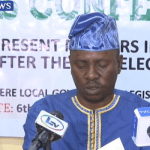A public health advocacy group is seeking prosecution of more medical professionals who fall short in their duties during patient care across some hospitals in the country.
The group believes many medical practitioners take the liberty to do wrong due to the long, tedious, and sometimes difficult justice system.
Over time, there has been an increase in the volume of reported cases of medical negligence across the country.
But, despite the high number of victims, there has been a very low level of formal complaints or even lawsuits.
Reports say this could be largely due to ignorance, poverty or even the reluctance to seek redress against the offending medical practitioner.
Things now seem to be taking a different turn with the recent criminal prosecution and first ever landmark conviction of Dr. Ejike Orji on a medical negligence case in a Lagos court.
The case took close to five years before his recent conviction and suspension of his medical licence.
The word here is to also encourage Nigerians to take legal steps whenever they find themselves in a case of medical negligence because all patients have rights.
Medical negligence is said to be the failure of the medical practitioner to exercise a reasonable duty of care in the course of duty as a professional.
Some key factors that fall under this line of action like,:
Failure to attend promptly to a patient requiring urgent attention when the practitioner was in a position to do so.
A manifestation of incompetence in the assessment of a patient.
Making an incorrect diagnosis particularly when the clinical features were so glaring that no reasonable skillful practitioner could have failed to notice them.
Failure to advise or proffering wrong advice to a patient on the risk involved in a particular operation or course of treatment, especially if such an operation or course of treatment is likely to result in serious side effects like deformity or loss of an organ.
Failure to obtain the consent of the patient (informed or otherwise) before proceeding on any surgical procedure or course of treatment, when such consent was necessary.
Making a mistake in treatment e.g. amputation of the wrong limb, inadvertent termination of a pregnancy, prescribing the wrong drug in error for a correctly diagnosed ailment, etc.
Failure to refer or transfer a patient in good time when such a referral or transfer was necessary.
Failure to do anything that ought reasonably to have been done under any circumstance for the good of the patient.
Failure to see a patient as often as his medical condition warrants or to make proper notes of the practitioner’s observations and prescribed treatment.














